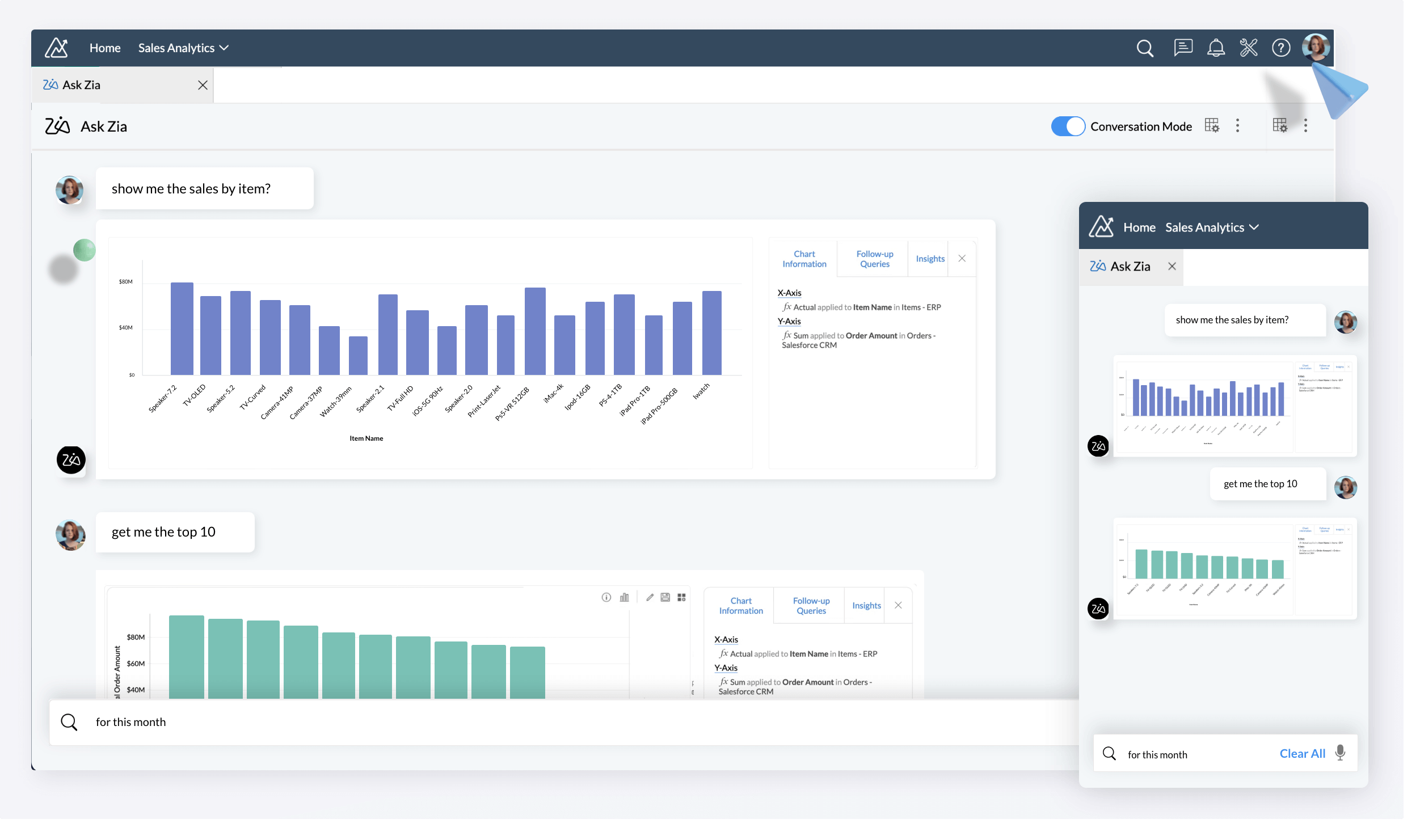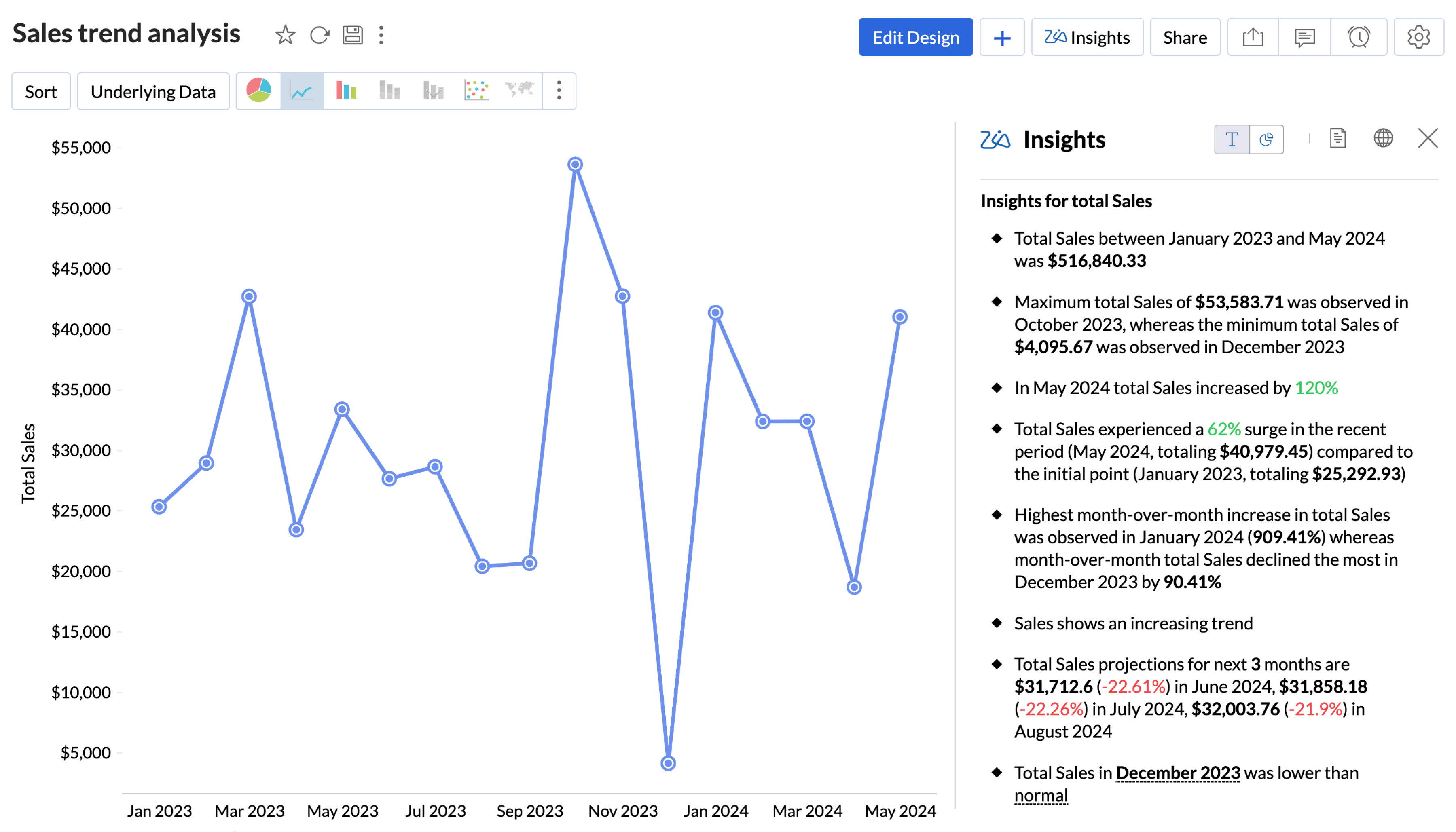AI Analytics
Business intelligence (BI) and data analytics have been at the forefront in recent years as businesses believe data-driven decisions make sense and give expected results. And it's true too. Since then, BI and data analytics platforms have helped organizations extract valuable insights from data.
To continue further, BI platforms are stepping into the next big thing to simplify and democratize data analysis: AI Analytics.
What is AI analytics?
AI analytics is a type of data analytics that combines artificial intelligence and advanced analytics techniques to extract meaningful insights from complex and large datasets, which might not be easily possible through traditional analytical models.
AI analytics includes the use of machine learning, natural language processing, and other modern technologies to process and analyze both structured and unstructured data.
AI vs. traditional analytics: What's the difference?
Traditional and AI analytics are two approaches that are both used to extract insights from data and make data-driven decisions. However, they differ in terms of their capabilities and methodology. Below is a quick comparison between AI and traditional analytics.
| AI Analytics | Traditional Analytics |
|---|---|
| Uses generative AI like ChatGPT | Involves complete manual work, from preparation to visualization |
| Uses advanced machine learning and deep learning algorithms to identify trends and patterns | Relies on manual analysis and predefined rules |
| Processes and analyzes data quickly and in real-time | Analysis speed is based on the data analyst, which can be time-consuming for |
| Handles large and complex datasets that are both structured and unstructured | Handles smaller and structured datasets |
| Processes large volumes of data | May face challenges when it comes to large volumes of data |
| Unearths hidden patterns and relationships only based on data | Extracts insights based on predefined rules |
| Offers predictive analytics for making informed decisions | Insights can be based on pre-existing assumptions |
In summary, the traditional analysis focuses on descriptive and diagnostic analysis only using predefined rules. However, AI analytics enables businesses to detect patterns, predict future outcomes, and extract insights automatically and quickly.
Benefits of AI analytics
The benefits listed below highlight the potential of AI analytics and how it enables organizations to gain actionable insights.
- Speed: With AI analytics, organizations can process and analyze huge volumes of data at a significantly faster pace. Since the data can be analyzed and insights can be generated in real-time, you can make decisions quickly in response to changing business conditions.
- No bias towards data: AI analytics eliminates the human bias towards data, which often hinders decision-making. You can ensure that decisions are based purely on data rather than personal opinions.
- Can run multiple simulations to predict future outcomes: With AI analytics, you can analyze historical data and simulate various scenarios so that you can make informed decisions and mitigate risks.
- Democratizes data and analytics: Long gone are the times when data analysis is accessible only to technical users. With AI analytics, all business users can visualize data and gather insights, even contextually within their business workflows using AI-powered embedded analytics. It enables access to data and insights across an organization and makes it accessible to a wider range of users or employees.
- Accuracy: By using advanced statistical models and machine learning techniques, AI can identify patterns and trends and provide insights with a higher degree of accuracy.
How AI analytics simplifies data analysis?
The data analysis process involves multiple steps, from preparing data to extracting meaningful insights. Here's how AI can simplify every step of the data analytics process—right from data preparation—and get you insights without much effort.
- Data preparation
- Data visualization
- Data insights
Data preparation
AI can help you in data preparation by streamlining the process of transforming data into a clean, structured, and ready-to-analyze format. Here are some ways in which AI helps in data preparation.
- Fetch public datasets: With AI, you can blend publicly available data and analyze it to get a complete picture.
- Write formulas: Let AI generate formulas to transform your data and derive KPIs. Make the data analysis-ready for easy data analysis.
- Create SQL queries: If you've been dependent on some technical person to combine or join tables because you don't know SQL, then you can set yourself free now, by opting to use AI analytics. AI can help you write SQL queries by simply entering your requirements in plain natural language.
Data visualization
AI can enhance the process of transforming raw data into meaningful visualizations. Here are several ways in which AI contributes to data visualization:
- Auto-generated reports and dashboards: After transforming the data in a ready-to-analyze format, you can choose to create a set of reports and dashboards automatically with a click of a button.
- Generative and search AI: Converse with AI in natural language and get reports and charts as answers in no time.

Data insights
AI can play a significant role in extracting data insights by leveraging its capabilities in data analysis, pattern recognition, and more. Here are some ways in which AI analytics can help you derive meaningful insights.
- Automated AI insights: Get actionable insights in the form of narratives from your visualizations. With the click of a button, you can find a set of insights in an easy-to-read format.
- Data forecasting: With advanced AI forecasting


AI-assisted analytics platform to get insights faster and more accurate
AI analytics is reshaping the way organizations extract insights from data. As a business, you'll need to stay ahead in every aspect, which includes BI and data analytics.
To simplify and streamline data analytics for your organization, you can use an AI-assisted analytics solution like Zoho Analytics. Zoho Analytics offers all the features listed above under Zia (Zoho's Intelligent Assistant).
Here's what Craig Roxby, Managing Director at Magnifi, had to say about using Zoho Analytics' Zia capabilities:
"Whenever I have a new client meeting, I demonstrate the Ask Zia feature of Zoho Analytics with a question like "what was my income last month?" Its quick reply or a visual fascinates my clients and they say, 'This is what we want'."
Read the full case study here.
Sign up with Zoho Analytics for a free 15-day trial and start augmenting your analytics journey today.
SIGN UP FOR FREE